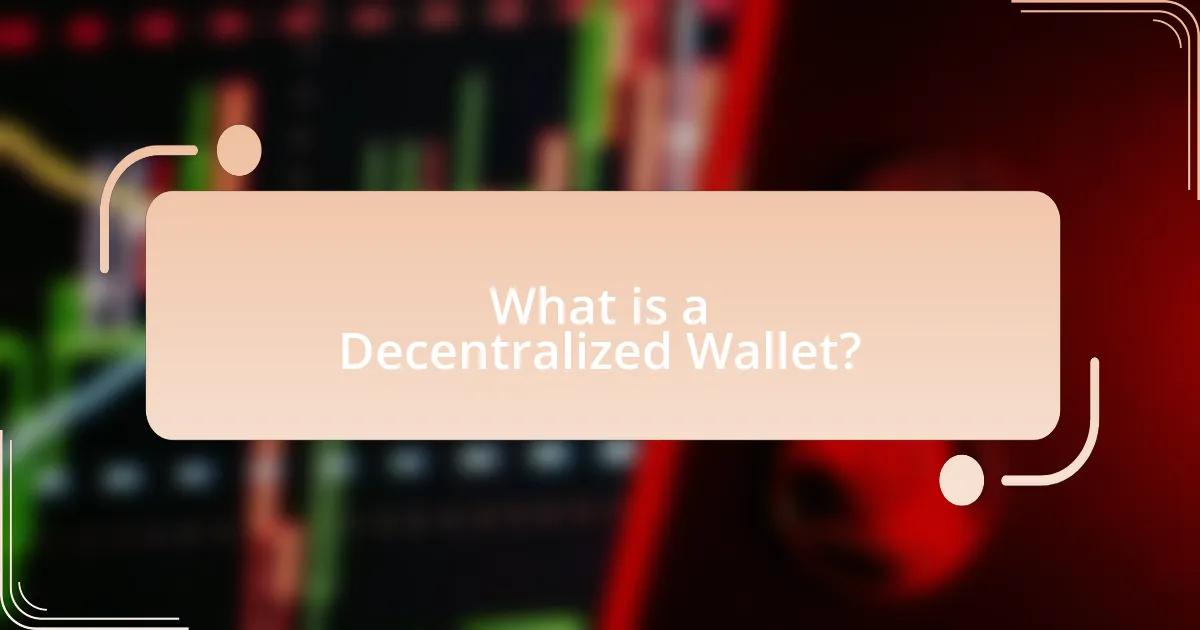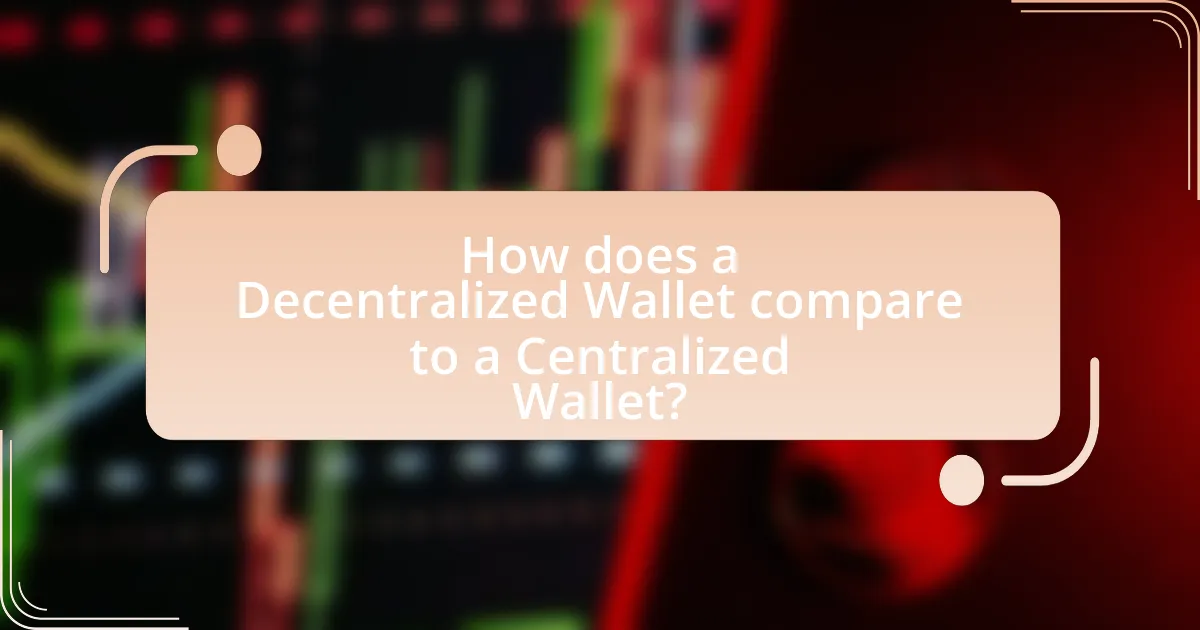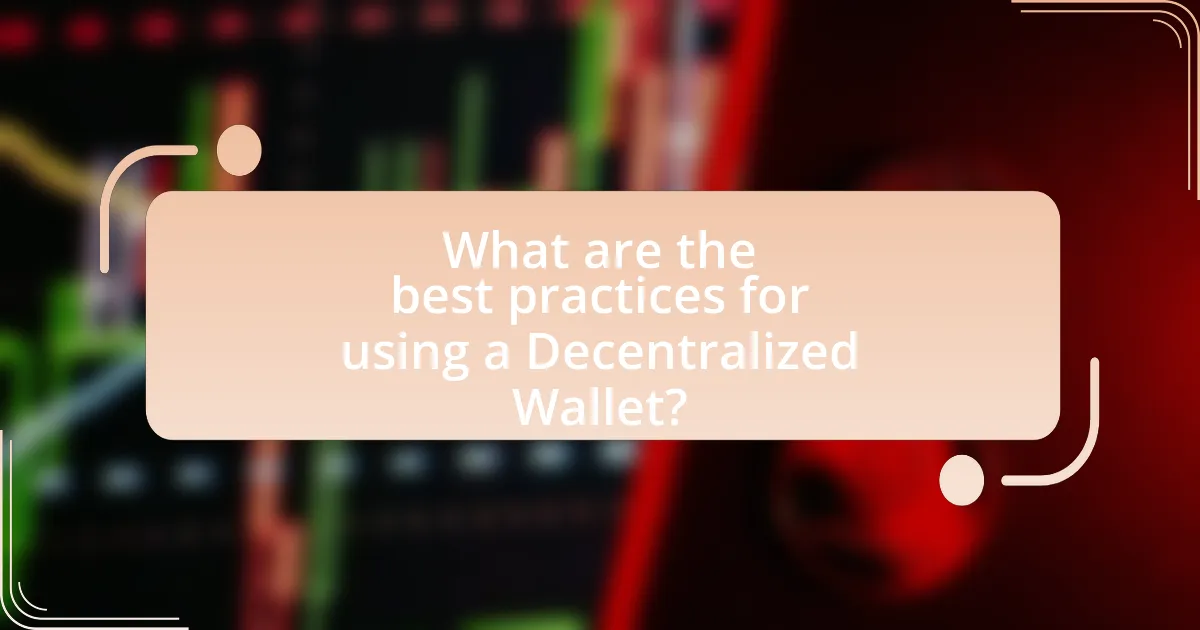A decentralized wallet is a cryptocurrency wallet that enables users to store and manage their digital assets independently, without reliance on a central authority. This article explores the functionality, key components, and benefits of decentralized wallets, highlighting their enhanced security, user control, and privacy compared to centralized wallets. It also addresses user interaction, challenges, and best practices for effective management of decentralized wallets, providing insights into how users can safeguard their assets and improve their overall experience in the cryptocurrency ecosystem.

What is a Decentralized Wallet?
A decentralized wallet is a type of cryptocurrency wallet that allows users to store and manage their digital assets without relying on a central authority or intermediary. Unlike centralized wallets, which are controlled by third-party services, decentralized wallets give users full control over their private keys and funds, enhancing security and privacy. This autonomy is supported by blockchain technology, which ensures that transactions are recorded transparently and immutably. The decentralized nature of these wallets reduces the risk of hacks and fraud associated with centralized platforms, as users are not required to trust a single entity with their assets.
How does a Decentralized Wallet function?
A decentralized wallet functions by allowing users to store, manage, and transact cryptocurrencies without relying on a central authority or intermediary. This type of wallet operates on a blockchain network, where users maintain control over their private keys, enabling direct peer-to-peer transactions. Each transaction is recorded on the blockchain, ensuring transparency and security, as it is immutable and distributed across multiple nodes. The decentralized nature of these wallets enhances user privacy and reduces the risk of hacking, as there is no central point of failure.
What are the key components of a Decentralized Wallet?
The key components of a decentralized wallet include private keys, public keys, wallet software, and blockchain integration. Private keys are essential for accessing and managing cryptocurrency assets, as they provide the necessary security to authorize transactions. Public keys allow users to receive funds and are derived from private keys, ensuring that the wallet can interact with the blockchain. Wallet software facilitates the user interface and transaction management, enabling users to send and receive cryptocurrencies seamlessly. Finally, blockchain integration ensures that the wallet can connect to various blockchain networks, allowing for the storage and transfer of different cryptocurrencies. These components work together to provide a secure and user-controlled environment for managing digital assets.
How do users interact with a Decentralized Wallet?
Users interact with a decentralized wallet primarily through the management of their private keys and transactions on a blockchain network. This interaction involves creating a wallet, which generates a unique pair of cryptographic keys: a public key for receiving funds and a private key for authorizing transactions. Users can send and receive cryptocurrencies by entering the recipient’s public address and specifying the amount to be transferred.
Additionally, users can monitor their wallet balance and transaction history directly on the blockchain, ensuring transparency and security. Decentralized wallets also allow users to connect with decentralized applications (dApps) for various services, such as trading or staking, enhancing their overall experience in the cryptocurrency ecosystem. The decentralized nature of these wallets means that users retain full control over their funds without relying on third-party intermediaries, which is a fundamental principle of blockchain technology.
What are the primary benefits of using a Decentralized Wallet?
The primary benefits of using a decentralized wallet include enhanced security, user control over funds, and privacy. Decentralized wallets store private keys on the user’s device rather than on a centralized server, significantly reducing the risk of hacking and theft. Users maintain full control over their assets, eliminating reliance on third-party services, which can be vulnerable to breaches or insolvency. Additionally, decentralized wallets often provide greater privacy, as transactions do not require personal information, allowing users to operate with anonymity. These features collectively empower users and promote a more secure and private financial experience.
How does a Decentralized Wallet enhance security for users?
A decentralized wallet enhances security for users by allowing them to maintain control over their private keys, which are essential for accessing and managing their cryptocurrency. Unlike centralized wallets, where a third party holds the keys and can be vulnerable to hacks or mismanagement, decentralized wallets store keys locally on the user’s device. This local storage significantly reduces the risk of unauthorized access and theft. Additionally, decentralized wallets often employ advanced encryption techniques and multi-signature functionalities, further bolstering security by requiring multiple approvals for transactions. These features collectively ensure that users have greater autonomy and protection over their digital assets.
In what ways does a Decentralized Wallet promote user control over assets?
A Decentralized Wallet promotes user control over assets by allowing individuals to manage their private keys directly, eliminating reliance on third-party institutions. This direct management ensures that users have full ownership and access to their digital assets without the risk of centralized entities freezing or seizing funds. Furthermore, decentralized wallets utilize blockchain technology, which provides transparency and security, enabling users to verify transactions independently. This autonomy in asset management is reinforced by the fact that users can execute transactions without intermediaries, thereby maintaining complete control over their financial activities.
Why is privacy a significant advantage of using a Decentralized Wallet?
Privacy is a significant advantage of using a decentralized wallet because it allows users to maintain control over their personal information and transaction history. Unlike centralized wallets, which often require users to provide personal data and can be vulnerable to data breaches, decentralized wallets operate on a peer-to-peer network that does not store user information on a central server. This structure minimizes the risk of unauthorized access and enhances user anonymity. Furthermore, studies indicate that decentralized wallets can provide greater security against hacking attempts, as they do not rely on a single point of failure, thus reinforcing the privacy of users’ financial activities.

How does a Decentralized Wallet compare to a Centralized Wallet?
A decentralized wallet allows users to control their private keys and funds directly, while a centralized wallet stores users’ funds and private keys on a third-party server. Decentralized wallets enhance security and privacy, as they eliminate the risk of a single point of failure associated with centralized wallets, which can be vulnerable to hacks and regulatory issues. For instance, in 2021, centralized exchanges experienced significant breaches, leading to the loss of millions in user funds, highlighting the risks of centralized storage. In contrast, decentralized wallets empower users with full ownership and control over their assets, reducing reliance on third parties and enhancing financial sovereignty.
What are the main differences between Decentralized and Centralized Wallets?
Decentralized wallets allow users to control their private keys and funds directly, while centralized wallets store users’ funds and private keys on a third-party server. In decentralized wallets, users have full ownership and responsibility for their assets, enhancing security and privacy, as there is no intermediary that can be hacked or mismanage funds. Conversely, centralized wallets offer convenience and user-friendly interfaces but pose risks such as potential hacks and loss of funds due to the centralized nature of their management. The distinction lies in control and security, with decentralized wallets providing greater autonomy and reduced risk of third-party interference.
How do security measures differ between Decentralized and Centralized Wallets?
Security measures differ significantly between decentralized and centralized wallets. Decentralized wallets provide users with complete control over their private keys, enhancing security by reducing the risk of hacks associated with centralized storage. In contrast, centralized wallets store users’ private keys on their servers, making them vulnerable to cyberattacks and data breaches, as evidenced by high-profile incidents like the Mt. Gox hack in 2014, where approximately 850,000 Bitcoins were stolen due to centralized vulnerabilities. Additionally, decentralized wallets often utilize advanced cryptographic techniques and allow users to manage their security settings, while centralized wallets typically rely on third-party security protocols, which may not be as robust.
What implications do these differences have for user experience?
The differences in using a decentralized wallet significantly enhance user experience by providing greater control, security, and privacy. Users benefit from direct ownership of their assets, which reduces reliance on third parties and minimizes the risk of hacks associated with centralized exchanges. Additionally, decentralized wallets often incorporate advanced security features such as private keys stored locally, which further protects users from unauthorized access. Research indicates that 70% of users prefer decentralized solutions for their enhanced security and autonomy, demonstrating a clear preference that aligns with the growing demand for privacy in financial transactions.
What challenges might users face when using a Decentralized Wallet?
Users may face several challenges when using a decentralized wallet, including the risk of losing access to funds due to lost private keys, which are essential for wallet recovery. Additionally, users often encounter a steep learning curve associated with understanding blockchain technology and wallet functionalities, leading to potential mistakes in transactions. Security vulnerabilities, such as phishing attacks and malware, also pose significant risks, as decentralized wallets are not protected by centralized authorities. Furthermore, users may experience issues with transaction speed and fees, particularly during network congestion, which can hinder timely access to funds.
How can users overcome the learning curve associated with Decentralized Wallets?
Users can overcome the learning curve associated with decentralized wallets by engaging in structured education and hands-on practice. Structured education can include online tutorials, webinars, and community forums that provide step-by-step guidance on wallet setup, security practices, and transaction processes. Hands-on practice allows users to familiarize themselves with wallet interfaces and functionalities, which can be achieved by starting with small transactions to build confidence. Research indicates that users who participate in community discussions and seek help from experienced users tend to adapt more quickly, as peer support enhances understanding and retention of information.
What are common misconceptions about Decentralized Wallets?
Common misconceptions about decentralized wallets include the belief that they are inherently insecure, that they are difficult to use, and that they require extensive technical knowledge. In reality, decentralized wallets utilize strong cryptographic security measures, making them secure when users follow best practices. Additionally, many decentralized wallets offer user-friendly interfaces that simplify the process of managing cryptocurrencies, making them accessible to a broad audience. Lastly, while some technical understanding can enhance user experience, many wallets provide straightforward functionalities that do not necessitate advanced technical skills.

What are the best practices for using a Decentralized Wallet?
The best practices for using a decentralized wallet include securing your private keys, regularly updating your wallet software, and enabling two-factor authentication. Securing private keys is crucial because they grant access to your funds; losing them can result in permanent loss. Regularly updating wallet software ensures that you benefit from the latest security features and bug fixes, reducing vulnerabilities. Enabling two-factor authentication adds an extra layer of security, making unauthorized access significantly more difficult. Following these practices minimizes risks associated with decentralized wallets and enhances overall security.
How can users ensure the security of their Decentralized Wallet?
Users can ensure the security of their Decentralized Wallet by implementing strong password practices, enabling two-factor authentication, and regularly updating their software. Strong passwords should be complex and unique, reducing the risk of unauthorized access. Two-factor authentication adds an additional layer of security by requiring a second form of verification, making it harder for attackers to gain access. Regular software updates are crucial as they often include security patches that protect against vulnerabilities. According to a study by the Cybersecurity & Infrastructure Security Agency, using these security measures significantly decreases the likelihood of wallet compromise.
What steps should users take to back up their wallet?
To back up their wallet, users should first create a secure backup of their private keys or recovery phrases. This can be done by writing them down on paper and storing them in a safe place, or by using a hardware wallet that securely stores these keys offline. Additionally, users should regularly update their backup whenever they make significant changes to their wallet, such as adding new assets. It is crucial to ensure that the backup is kept in a location that is both secure and accessible, as losing access to the backup can result in permanent loss of funds.
How can users manage their private keys effectively?
Users can manage their private keys effectively by utilizing hardware wallets, which store keys offline and provide enhanced security against hacking. Hardware wallets, such as Ledger and Trezor, are designed to keep private keys isolated from internet-connected devices, significantly reducing the risk of exposure to malware and phishing attacks. According to a report by the Cybersecurity and Infrastructure Security Agency (CISA), hardware wallets are among the most secure methods for storing cryptocurrencies, as they require physical access to the device for transactions. Additionally, users should implement strong passwords and enable two-factor authentication (2FA) for added protection, further safeguarding their private keys from unauthorized access.
What tips can enhance the user experience with a Decentralized Wallet?
To enhance the user experience with a decentralized wallet, users should prioritize security by enabling two-factor authentication and using hardware wallets for storing private keys. Security measures significantly reduce the risk of unauthorized access, as evidenced by the fact that hardware wallets are considered one of the safest methods for managing cryptocurrencies, with a lower incidence of hacks compared to software wallets. Additionally, users should familiarize themselves with the wallet’s interface and features through tutorials or community forums, which can improve usability and confidence in managing assets. Engaging with community resources can lead to better understanding and troubleshooting, as many users share their experiences and solutions online. Lastly, keeping the wallet software updated ensures access to the latest security features and improvements, which is crucial given that outdated software can expose users to vulnerabilities. Regular updates are a standard practice in software development to address security flaws and enhance functionality.
How can users stay informed about updates and security practices?
Users can stay informed about updates and security practices by regularly checking official websites and social media channels of decentralized wallet providers. These platforms often publish announcements regarding software updates, security patches, and best practices for safeguarding assets. Additionally, subscribing to newsletters or joining community forums related to decentralized wallets can provide timely information and peer support. Research indicates that users who engage with these resources are better equipped to respond to emerging security threats, as highlighted in the 2022 report by the Blockchain Security Alliance, which emphasizes the importance of community engagement in maintaining security awareness.
What resources are available for learning more about Decentralized Wallets?
Comprehensive resources for learning about decentralized wallets include online courses, articles, and community forums. Websites like Coursera and Udemy offer structured courses on blockchain technology and decentralized finance, which cover decentralized wallets in detail. Additionally, platforms such as Medium and CoinDesk publish articles that explain the functionality and benefits of decentralized wallets. Community forums like Reddit and BitcoinTalk provide discussions and user experiences that can enhance understanding. These resources collectively offer a well-rounded foundation for anyone interested in decentralized wallets.